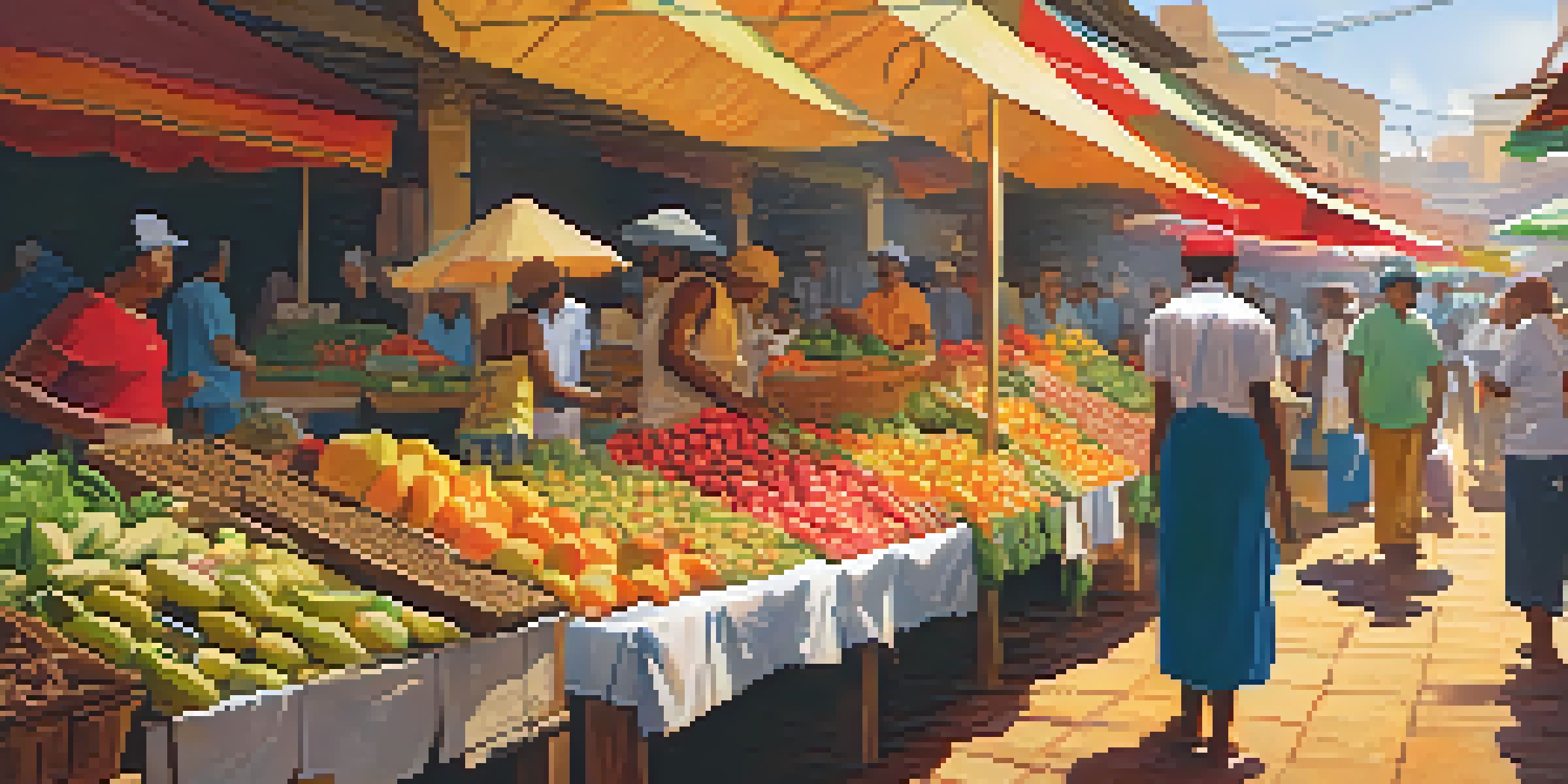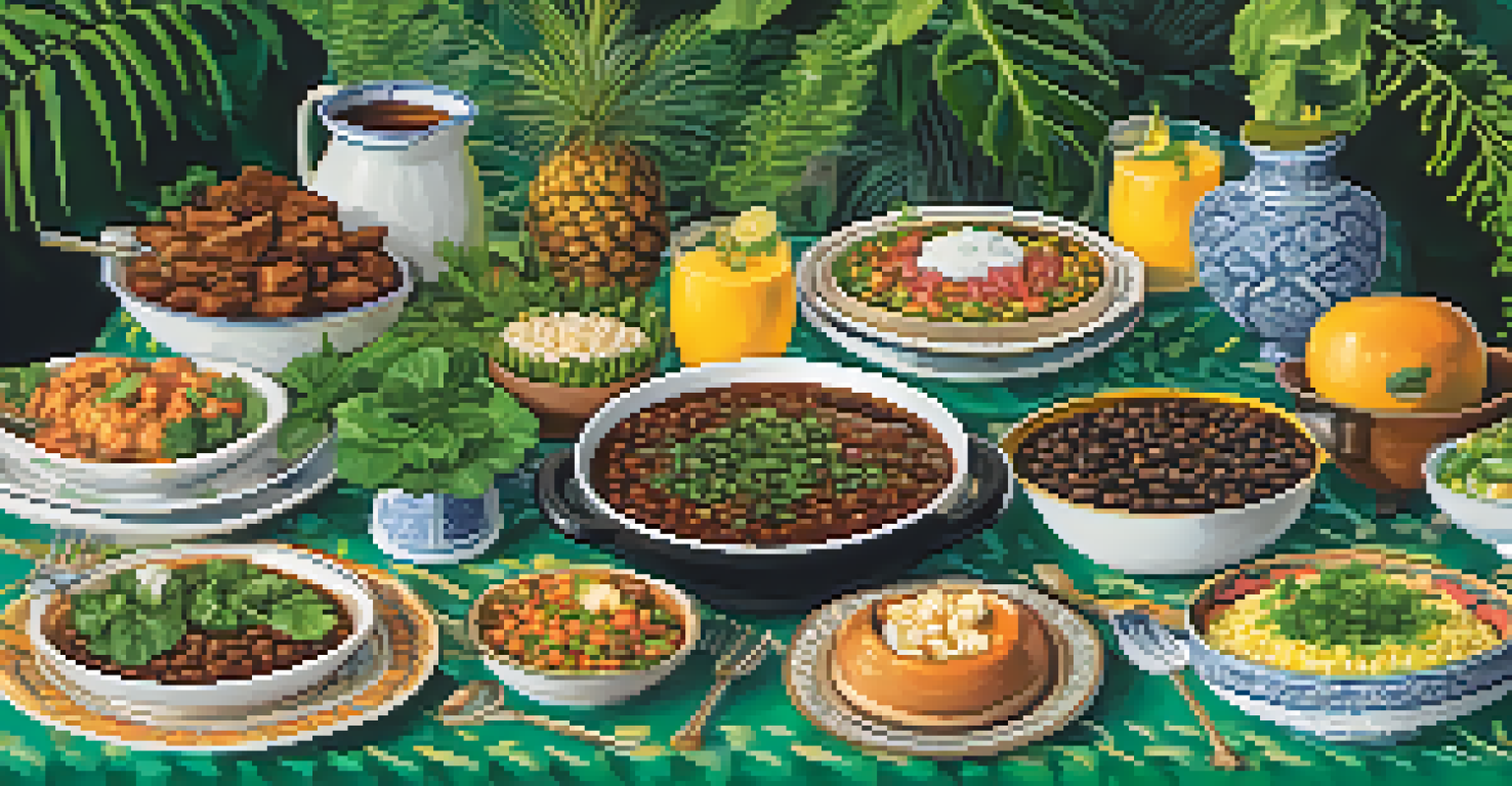Cultural Immersion: Health Benefits of Brazilian Cuisine

Understanding Brazilian Cuisine and Its Rich Diversity
Brazilian cuisine is a vibrant tapestry of flavors, influenced by indigenous, African, and Portuguese traditions. Each region of Brazil offers its own unique dishes, showcasing local ingredients and cooking techniques. From the spicy stews of Bahia to the grilled meats of the South, the variety is astounding and reflects the country's cultural richness.
Food is our common ground, a universal experience.
Immersing yourself in Brazilian cuisine can be a gateway to understanding its cultural significance. Food in Brazil is often about communal gatherings and celebrations, where families come together to share meals. This cultural aspect fosters a sense of belonging and connection, enhancing the overall experience of enjoying these dishes.
By exploring Brazilian cuisine, you not only tantalize your taste buds but also engage with the stories and traditions behind each dish. This cultural immersion can lead to a deeper appreciation of the food, making meals more meaningful and enjoyable.
Nutritional Benefits of Popular Brazilian Dishes
Many Brazilian dishes are based on whole, natural ingredients that offer numerous health benefits. Staples like beans, rice, and fresh vegetables provide essential nutrients and fiber, promoting digestive health. For example, feijão (beans) is a common ingredient, rich in protein and vitamins that contribute to a balanced diet.

Seafood also plays a significant role in Brazilian cuisine, particularly in coastal areas. Dishes like moqueca, a fish stew, are not only delicious but also packed with omega-3 fatty acids, which are known to support heart health. Incorporating these types of dishes into your diet can provide a variety of health benefits while expanding your culinary horizons.
Brazilian Cuisine's Cultural Significance
Brazilian cuisine is not just about food; it's a celebration of community and cultural connections through shared meals.
Moreover, the use of fresh herbs and spices in Brazilian cooking adds flavor without the need for excessive salt or fat. Ingredients like cilantro, garlic, and lime not only enhance taste but also provide antioxidants that can combat inflammation and boost overall wellness.
Cultural Connections: Food as a Social Experience
In Brazil, meals are often communal events that bring people together. Sharing food fosters relationships and creates a sense of community, which can be beneficial for mental health. Engaging in social dining can reduce feelings of loneliness and enhance emotional well-being.
Cooking is like love. It should be entered into with abandon or not at all.
Participating in traditional Brazilian food festivals or family gatherings allows you to experience the joy of cooking and eating together. These events often feature live music, dancing, and lively conversation, creating a holistic experience that nourishes both body and soul. The act of sharing food becomes a celebration of life and culture.
By immersing yourself in these social aspects of Brazilian cuisine, you not only enjoy delicious meals but also contribute to a healthier lifestyle. The positive emotions associated with shared experiences can lead to reduced stress and improved happiness.
Exploring Regional Ingredients and Their Health Benefits
Brazil is home to a variety of unique ingredients that offer health benefits. For instance, açaí berries, native to the Amazon rainforest, are celebrated for their antioxidant properties and are often used in smoothies and bowls. Including such superfoods in your diet can enhance your overall health and vitality.
Another example is the use of cassava, a root vegetable that is high in carbohydrates and fiber. It's often used in dishes like farofa, a toasted cassava flour mixture, which can add texture and nutrients to meals. This versatility makes it a staple across many Brazilian dishes, contributing to a balanced diet.
Health Benefits of Regional Dishes
Popular Brazilian dishes feature whole, natural ingredients that provide essential nutrients and promote overall health.
By understanding and incorporating these regional ingredients into your cooking, you not only embrace Brazilian culture but also reap the health benefits they offer. This exploration of local flavors can inspire creativity in your kitchen and encourage healthier eating habits.
Mindfulness in Cooking: A Brazilian Perspective
Cooking Brazilian dishes encourages mindfulness, as it often involves intricate preparation and attention to detail. This practice can be a form of meditation, allowing you to focus on the task at hand and reduce stress. The rhythmic chopping of vegetables or the gentle simmering of a stew can be soothing and grounding.
Moreover, the process of cooking with fresh ingredients can foster a deeper connection to food. Understanding where ingredients come from and how they contribute to a meal enhances appreciation and gratitude. This awareness can lead to healthier eating choices and a more sustainable lifestyle.
As you immerse yourself in the cooking process, you may find joy and satisfaction in creating something delicious. This mindfulness not only enhances the eating experience but also promotes overall well-being, making every meal a celebration of health and culture.
The Role of Brazilian Beverages in Health and Wellness
Beverages play an essential role in Brazilian culture, with options ranging from refreshing coconut water to the famous caipirinha. Coconut water is particularly hydrating and packed with electrolytes, making it a popular choice in Brazil's tropical climate. Incorporating such drinks into your diet can help maintain hydration and support overall health.
Another traditional beverage, chimarrão, is a type of green tea that is rich in antioxidants. Drinking chimarrão not only provides health benefits but also offers a unique cultural experience, as sharing this beverage is a social ritual in Brazil. Engaging in such traditions can enhance your sense of community and connection.
Mindfulness Through Cooking
Cooking traditional Brazilian meals fosters mindfulness, enhancing appreciation for food and promoting a healthier lifestyle.
By exploring Brazilian beverages, you can discover how they complement meals and contribute to a holistic approach to health. These drinks often reflect the local environment and culture, further enriching your culinary journey.
Embracing Brazilian Cuisine for a Healthier Lifestyle
Integrating Brazilian cuisine into your diet can be a delightful way to promote health and well-being. The emphasis on fresh ingredients and communal dining encourages mindful eating and healthier choices. By incorporating these practices, you can create a more balanced and enjoyable approach to food.
Exploring Brazilian dishes also allows you to experiment with new flavors and cooking techniques. This culinary adventure can reignite your passion for cooking and inspire you to try healthier recipes. The process of learning about and preparing these dishes can be both fun and rewarding.

Ultimately, embracing Brazilian cuisine offers a unique opportunity for cultural immersion while prioritizing health. By celebrating the flavors and traditions of Brazil, you can cultivate a lifestyle that nourishes both your body and spirit.